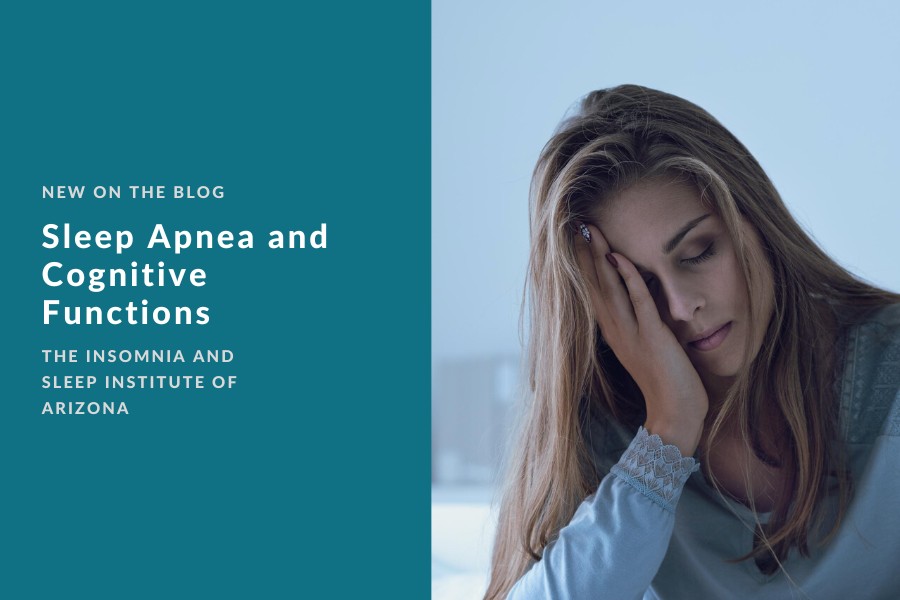Sleep apnea affects every facet of your life, including key cognitive functions according to a recent study. Obstructive sleep apnea (OSA) is one of the most common conditions treated at The Insomnia and Sleep Institute of Arizona, with CPAP being the gold standard in management. According to a study that was recently presented at the European Respiratory Society International Congress, OSA was especially associated with a worsening in cognitive function in those 74+ years old—and particularly in men. The study also revealed that, surprisingly, some cognitive functions were not affected by sleep apnea at all.
The research team analyzed those 65+ years old from Lausanne, Switzerland as part of two studies that took place from 2003 – 2008. A follow-up of participants took place every five years. In total, 358 participants took a sleep test to determine if OSA was present and its severity. The first follow-up appointments, which happened in 2009 – 2013, analyzed mental processing abilities and a second cognitive assessment took place.
Cognitive Test Assessments with OSA
Cognitive tests that occurred during these studies included reasoning and knowledge skills, executive functioning (such as the ability to make decisions or triage of tasks), visual spatial perception between objects, language, verbal memory, and global cognitive function. During the Congress, authors shared that, “We found that OSA and, in particular, low oxygen levels during sleep due to OSA, was associated with a greater decline in global cognitive function, processing sleep, executive function, and verbal memory.” Additionally, the authors stress that men and all who are 74+ years old were at ”higher risk of cognitive decline related to sleep apnea in some specific cognitive tests.”
One example is the Stroop test, which determines executive function and processing speed. There was a much bigger decline in those who were 74+ in these regards compared to those who were younger. Plus, the verbal fluency test found a steeper decline in men compared to women regardless of age. The researchers say, “This study demonstrates that the severity of sleep apnea and night-time oxygen deprivation contribute to cognitive decline in old age.” It also shows that OSA is linked to a decline in certain cognitive functions including verbal memory, processing speed, and executive function. Curiously, there was not a decline in other functions like visuospatial function and language.
What to Do to Improve Cognitive Function
Those who have OSA need to know that this condition can increase cognitive decline. However, OSA is notoriously misdiagnosed and under-diagnosed. Further, many with OSA do not adhere to proper CPAP compliance standards which require 4+ hours of use per night. The researchers do note that not everyone with OSA necessarily has a cognitive decline, btu that there is “probably a subgroup of patients, particularly those with greater nocturnal oxygen deprivation but also older patients and men, who could be at greater risk of OSA-related cognitive decline.”
In the future, the researchers have plans to examine the data on how OSA impacts cognitive function after a ten-year period. A randomized controlled trial for these patients may be best, particularly to see how CPAP affects cognition. Until then, those with OSA or who suspect they have OSA have many tools available to help manage this common disorder. If you have been diagnosed with OSA, ensuring you have the proper equipment and accessories is critical for CPAP adherence. If you suspect you have OSA or another sleep disorder, scheduling a consultation with a sleep expert capable of diagnosing disorders is key.
In the rare case that CPAP is not effective, alternatives like the Inspire implant may be for you. However, anyone seeking to get this implant needs to have tried CPAP before becoming eligible for the implant. The Insomnia and Sleep Institute is one of the few sleep centers where implants are available and no referral is needed to schedule your consultation. Get the sleep you need and deserve in order to improve every part of your life, including cognitive functioning and brain health. To learn more and schedule your consultation, get in touch today. Call the office during business hours or, for an even faster response, simply fill out the online contact form now.





